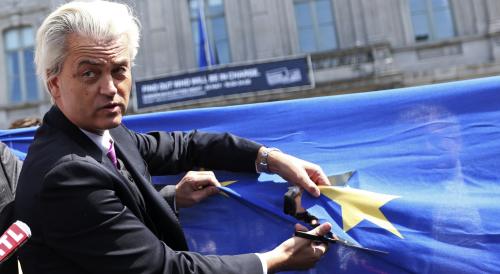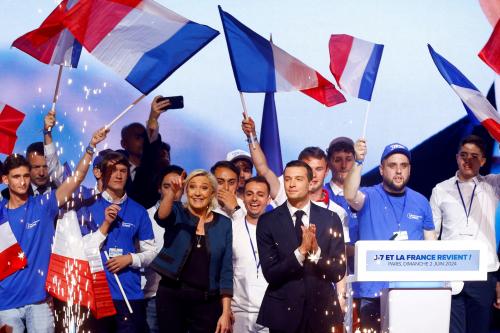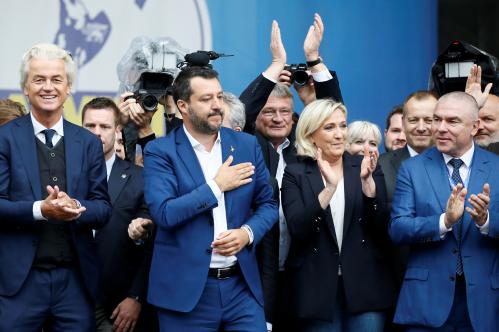The Twitter habits of the president of the United States are well-documented and much-discussed. However, President Trump’s fondness for social media is not unique — it is a feature he shares with his European populist counterparts.
Populists throughout the West were early adopters of social media and such platforms quickly became a favorite tool for political communication. Today, populists are the stars in political cyberspace, far outshining their centrist opponents. The 2015 Facebook posts of the United Kingdom Independence Party, the leading voice of the Brexit campaign, received 4,000 likes on average, twice the number received by the Conservative Party. While Dutch voters rejected the populist, anti-immigrant candidate Geert Wilders in its recent election, Wilders’ social media following greatly outpaces that of other Dutch party leaders.
Similarly, the far-right Alternative for Germany (AfD) boasts the largest social media following among German political parties. Despite the fact AfD receives half the support Angela Merkel’s Christian Democrats receives, it possesses a Facebook following twice as large. Marine Le Pen’s National Front is well-known for its digital prowess, with an office in Paris dedicated exclusively to managing the party’s social media presence and aggressively launching online campaigns that include viral hashtags, memes, and animated videos. Le Pen’s far left opponent in the first round of voting, Jean-Luc Mélenchon, demonstrated a similar social media preeminence. With a YouTube channel hosting some videos with over five million views and a Facebook following of over 900,000, Mélenchon fans took their enthusiasm to the web. An online community of his grassroots supporters even created a video game, Fiscal Kombat, where players took on the oligarchy by chasing after rich men and redistributing their wealth.
Members of European Parliament belonging to the anti-EU group Europe of Nations and Freedom have their tweets shared 28 times on average compared to the six shares enjoyed by MEPs from mainstream parties. This trend is mirrored by the far left. European Parliament’s European United Left-Nordic Green Left holds just over 4 percent of seats in parliament but makes up nearly 30 percent of MEPs twitter followers.
Restoring popular sovereignty
The support enjoyed by populists in the digital democracy raises questions about whether social media plays a key role in strengthening the present-day populist threat to liberal democracy.
A recent report on populists’ use of social media from Paul-Jasper Dittrich of the Jacques Delors Institut asks “how important is a larger ‘buzz’ on social networks, and could it potentially become a game changer in elections?” Despite all the evidence that populists dominate social media spaces, Dittrich deems the idea that this translates into electoral victories “far-fetched.” Rather than looking to social media as an explanation for rising populism, the more interesting question for inquiry is why the features of social media lend themselves especially well to the promulgation of populist messages and figures.
According to Dutch political scientist Cas Mudde, populism is best understood as a “thin-centered” ideology that views politics as a battle between the “corrupt” elite and “pure” people and posits that populists alone can legitimately represent “the people.” Populism and social media make good companions because platforms like Twitter and Facebook allow for direct communication between party leaders and their constituencies. This accords with populist calls to restore popular sovereignty, fulfilling the most basic promise of democracy, rule by the people.
Unlike traditional news media, there are no gatekeepers in social media who fact check information or help the public make sense of political events. Additionally, social media challenges the meritocratic values of traditional media – on Twitter, pundits and experts do not enjoy an elevated platform. This characteristic of social media reinforces populists’ anti-establishment ideology.
Visceral reaction
Social media is particularly conducive to the emotional appeals embraced by populists. Candidates attract many supporters by responding viscerally to feelings of injustice and anxiety, a political approach readily employed in the wake of terrorist attacks. Mebel Berezin, a Cornell University sociologist studying the European far right, notes that the common line urging voters not to give into fear often loses out to a populist message that validates fear. Populists consistently experience surges in social media following and engagement after specific news events, especially terrorist attacks. This suggests that populists turn to social media following major national tragedies to identify enemies to the nation and make calls for swift action. Most centrist politicians are wary of doing the same, favoring deliberate messaging that seeks to assuage a frightened nation while upholding multicultural and religious tolerance. Evidently, a populist narrative translates well into short tweets and posts that reinforce the tendencies of some and spark feelings of outrage in others.
Facebook fans for Alternative for Germany (AfD), 2015-2016
Facebook fans for top four French presidential candidates, January 2015-March 2017
An international populism?
While not all populists are winning at the ballot box, a social media-driven internationalist populism gives all proponents of liberal democracy reason to pause. Though populists promise a return to national sovereignty, their social media following is notably international. Between 20 and 30 percent of the likes on populist parties’ social media posts come from outside the party’s country (for Marine Le Pen, 40 percent of her likes originate outside France). There even exist online forums to aid the international populist wave. Using a shared document entitled “Make Europe Great Again,” French Le Pen supporters coordinate with American Trump supporters to create fake social media accounts and storm comment sections with pro-National Front messages.
International support online for populism is not merely exercised by supporters, leaders themselves oftentimes display a digital solidarity with one another. On the night of the U.S. election, Geert Wilders tweeted,
Florida and Utah for @realDonaldTrump
The people are taking their country back.
So will we.
— Geert Wilders (@geertwilderspvv) November 9, 2016
And following the attack on French police this past Thursday, Trump tweeted,
Another terrorist attack in Paris. The people of France will not take much more of this. Will have a big effect on presidential election!
— Donald J. Trump (@realDonaldTrump) April 21, 2017
(His past praise for Le Pen makes clear this tweet was embedded in a larger quest to amplify a pro-populist message.)
Although understanding the long-term ramifications of populists’ social media use requires further research, if future studies discredit social media as an explanatory variable for the populist growth in recent years, it should not necessarily come as a relief to defenders of the liberal democratic order. Populists have an extensive history of pushing mainstream parties to adopt their positions and behavior. For example, many leaders across the political spectrum have been forced to concede to anti-immigrant stances and cultural protectionism as populists’ issues gain the support of a vocal minority. The success of populists on social media even has The Economist urging the political center to take heed, calling on “centrist politicians… [to] stop twiddling their thumbs and get tweeting.” However, history cautions against borrowing from the populist playbook. Given the symbiotic union between social media and populism, a centrist politics may find itself hard-pressed to compete. Just as social media strengthens the populist position, a centrist politics should find renewed vitality by elevating civic discourse and restoring faith in expertise both online and offline.
The Brookings Institution is committed to quality, independence, and impact.
We are supported by a diverse array of funders. In line with our values and policies, each Brookings publication represents the sole views of its author(s).











Commentary
Why are populists winning online? Social media reinforces their anti-establishment message
April 28, 2017